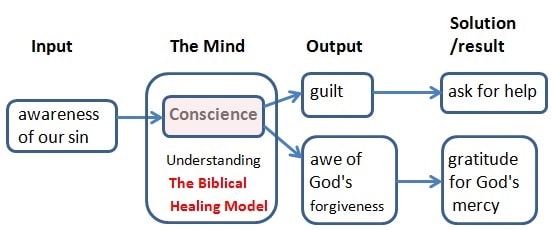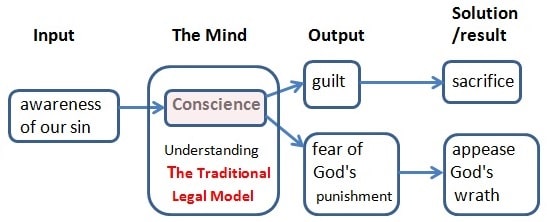Conscience – definition
 The meaning is similar between the two gospel models. The main and very important difference is how a clear conscience is achieved.
The meaning is similar between the two gospel models. The main and very important difference is how a clear conscience is achieved.
Traditional Legal Model – a clear conscience is achieved by having the record of our sins cleared by the payment of a penalty and understanding that God has forgiven us of them.
Biblical Healing Model – a clear conscience is achieved by making wrongs right, yes, but also by ceasing to do the wrongs that cause guilt and shame. Also, knowing that God unconditionally forgives all our sins, does not hold our past against us and wants to help us overcome.
Definitions:
“Conscience (noun) – the inner sense of what is right or wrong in one’s conduct or motives, impelling one toward right action.”
(www.dictionary.com/browse/conscience)
Webster’s 1828 Dictionary
“Internal or self-knowledge, or judgment of right and wrong; or the faculty, power or principle within us, which decides on the lawfulness or unlawfulness of our own actions and affections, and instantly approves or condemns them.
(http://webstersdictionary1828.com/Dictionary/conscience)
The conscience, when activated, brings feelings of conviction to do or to not do something: “I should …,” “I should not …,” “I should have …,” “I should not have ….” We may feel a compulsion to change course before, during or after an action.
Is a Good Conscience Possible?
“Thy word have I hid in mine heart, that I might not sin against thee.” (Psa 119:11)
“How much more shall the blood of Christ, who through the eternal Spirit offered himself without spot to God, purge your conscience from dead works to serve the living God?” (Heb 9:14)
It seems that a clear conscience must be possible and it is a necessity to achieve true peace of mind.
How is the Conscience Cleansed?
Here is one misunderstanding of how our consciences can be cleansed:
“This is an amazing promise! Christ cleansing our consciences from acts that lead to death!
How does he do it? By the blood of Christ, because on the cross he offered himself unblemished to God! He offered himself—his unblemished, perfect life—as a sacrifice to God for us on account of our sins. Therefore, he alone is able to cleanse our consciences through his blood.”
(https://unlockingthebible.org/2019/05/how-get-keep-good-conscience/)
While that source rightly attributes cleansing to Christ’s blood, the process is generally misunderstood. It has often been described as merely the blotting out of a record of sins to cancel a debt we owe to God because of His need for appeasement.
While the quote speaks of “cleansing our consciences” it is described as a mere transaction (“on account of our sins”) even though it says we are being cleansed from “acts.” Rightly understood, the conscience is cleansed not by erasing a record but by dealing with the dead (evil) works so that the conscience can be clear.
We have all sinned in our past. God has forgiven us and wants us to stop sinning so that we are no longer hurting ourselves and others. We need to accept His forgiveness, forgive ourselves, right any wrongs with others, change some habits etc and then we will have a clean conscience.
Paul’s Conscience
It is interesting to read what Paul said about his conscience:
“And Paul, earnestly beholding the council, said, Men and brethren, I have lived in all good conscience before God until this day.” (Acts 23:1)
“I thank God, whom I serve from my forefathers with pure conscience, that without ceasing I have remembrance of thee in my prayers night and day;” (2 Tim 1:3)
“And herein do I exercise myself, to have always a conscience void of offence toward God, and toward men.” (Acts 24:16)
Did he never sin or make a mistake? I don’t think he is saying that; Paul also wrote:
“For all have sinned, and come short of the glory of God;” (Rom 3:23)
He was never knowingly living in rebellion to God. Even when persecuting Christians he understood himself to be doing God’s will:
“I verily thought with myself, that I ought to do many things contrary to the name of Jesus of Nazareth.” (Acts 26:9)
That verse is a way of saying that Paul lived according to his conscience. Perhaps it was Paul’s very active conscience and determination to follow it that made him the choice for the great work that God called him for.
The Conscience of Non-believers
Do only believers have a conscience or an active conscience?
“For when the Gentiles, which have not the law, do by nature the things contained in the law, these, having not the law, are a law unto themselves: Which shew the work of the law written in their hearts, their conscience also bearing witness, and their thoughts the mean while accusing or else excusing one another;)” (Rom 2:14-15)
The state of the conscience is closely connected to the thoughts. If the conscience says “guilty” the thoughts will be accusing. If the conscience sees no problem with the thoughts, words or action then there is no guilt felt.
The passage above speaks of “thoughts … accusing.” That would happen in response to a wrong action which shows the role of the conscience.
“Their thoughts” would be thoughts activated by their consciences. How can the Gentiles (at least some of them) have the law written in their hearts when God is proposing to write His law in the heart of His people implying it is not yet written there? Are there Gentiles who “have not the law” and yet are ahead of God’s people in terms of having an appreciation of its principles? Is it possible that having the law in the heart is much more a matter of living by its principles than it is of knowing its details?
Sin and Grace Abounding
This verse related to the conscience can seem confusing:
“Moreover the law entered, that the offence might abound. But where sin abounded, grace did much more abound:” (Rom 5:20)
What is the relationship of that verse to the conscience? Where is the law entering? This expanded paraphrase may help (added words in red):
“Moreover the requirements of the law entered the understanding of the conscience, that the awareness of offence might abound in a sensitive conscience. But where awareness of sin and its negative effects abounded, knowledge, appreciation and acceptance of grace did much more abound:” (Rom 5:20, Ray Foucher paraphrase)
God, of course, does not want offenses (sins) themselves to abound but, once committed, a greater awareness of them can be the means to show a person their spiritual need so that they will avail themselves of the freely-offered grace.
Comparison with Physical Pain
Can you think of the one event in your life you would most like to have skipped? For many people it is an incident involving mental/emotional pain rather than physical pain.
It is said that emotional and physical pain are almost the same in their effects on your brain. However, emotional pain from an injured conscience can often be worse than physical pain. This is borne out by the fact that people will use physical pain as a distraction from emotional pain but not vice versa. Memories (certainly including those from the conscience) can trigger emotional pain but not physical pain.
| Conscience | Pain |
| mental | physical |
| alerts re guilt of wrong action | alerts re physical injury or illness |
| prompts to correct behavior, confess | directs care to the injury or illness |
| can be masked with alcohol, attitude | can be masked with analgesic drugs |
Both are involuntary – you can’t just decide not to feel pain or to turn off a guilty conscience (although its functioning can be gradually decreased).
It is interesting that there is no mention in scripture of Christ’s physical pain during the crucifixion but there is of His mental anguish.
Scripture indicates that the record of our sins is in our minds (heart):
“The sin of Judah is written with a pen of iron, and with the point of a diamond: it is graven upon the table of their heart, and upon the horns of your altars;” (Jer 17:1)
We should consider how our minds process knowledge of our sins.
The Function of the Conscience in the Two Gospel Models
When one understands the Biblical Healing Model they realize that God does not require payment for sin and that forgiveness is always freely given. The conscience need not be bothered with continued guilt. Guilt is not a punishment; it is only meant to alert us to our need to find a solution to our sin. Here is a diagram of the conscience (a function of the mind) according to the Biblical Healing Model:

Compare that to the function of the conscience according to the Traditional Legal Model:

The solution to bring about atonement in the Traditional Legal Model is to offer a sacrifice to appease God’s wrath. That sacrifice could be either an animal substitute or, after the cross, an acceptance of the sacrifice of God’s Son on the sinner’s behalf. In some belief systems, even with “human” sacrifice, some form of penance as payment on the part of the sinner was still required.
Another option is that the sinner does not even seek for a solution for his sin and guilt but continues in impenitence – a complete disregard for the problem. The result of that is this process:
“But after thy hardness and impenitent heart treasurest up unto thyself wrath against the day of wrath and revelation of the righteous judgment of God;” (Rom 2:5)
Our conscience has been called a “moral muscle” implying that it is possible to exercise it or not. Think: “use it or lose it.” To do nothing, to not seek for a resolution of guilt, results in it continuing. Even the ability to feel guilt (have an active conscience) is a faculty of the mind the function of which, if not used, decreases over time.
There is more discussion of the role of the conscience especially in the final judgment scene in the ebook The Lake of Fire and the Second Death.
See a video of a group study on the meaning of the terms Conscience, Guilt and Shame.
Return to the Character of God and the Gospel Glossary Index
Return to the Home Page

December 18, 2021 @ 4:47 am
Excellent!